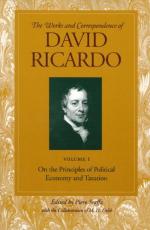|
This section contains 6,983 words (approx. 24 pages at 300 words per page) |

|
Dictionary of Literary Biography on David Ricardo
David Ricardo was one of the most important figures involved in the creation of the classical school of economics in the nineteenth century. This school, built upon the foundation of Adam Smith's Wealth of Nations (1776), included such luminaries as Jeremy Bentham and John Stuart Mill. It developed a new approach to economic policy and had at its core a comprehensive liberal philosophy that transcended traditional economic interest. In its broadest sense the classical ideal was the maximization of economic freedom within a framework of law and order, sometimes called the doctrine of laissez-faire. Its objective was the substitution of liberalism and individualism for authoritarianism and paternalism; or, to put it in terms of systems, the replacement of mercantilism by the values of the new commercial society.
Ricardo's contribution to this tradition was an explanation of the working of the economy and the determination of the best means to...
|
This section contains 6,983 words (approx. 24 pages at 300 words per page) |

|


